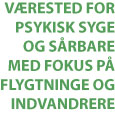| MUHABET
MEANS TOGETHERNESS
Mentally ill refugees and immigrants are a marginalized
and invisible group and the percentage of this group who are admitted into hospital
is still increasing. Many are traumatized-suffering from
PTSD due to war-flight –etc. while others are
suffering from a mental illness after a long life in
Denmark. Very often they are extremely lonely and isolated
have no contact at all with their local community due to language
barriers as well as cultural ones.
That is why Najib and Emine in the spring of 2003 started
Muhabet in order to give this forgotten group some where
to come – find peace - meet others in the same
situation but also to make the outside world aware of
them. The large windows of the drop-in center are symbolized
by the fact that the world can look in and the guests
can look out.
Muhabet is designed like a café, with sofas,
chairs, tables and an open kitchen. There is a rather
big cellar where children can play and use the computers,
a another room is for praying and bellydancing. Everything
is painted in warm colours reminding the guests of home.
During the opening hours the guests meet the volunteers
over a cup of tea or coffee talking about everything.
It is possible to be advised about small matters, like
how to call the municipality, translating a letter etc.
Or you can be left alone.
Be yourself and yet be part of a group without feeling
like an outsider and if you like - take a nap. You are
not registered and we meet you like you are: A human
being. There is no hidden agenda, no religious party
and no political party is involved. A lot of the guests
have a very bad economy and don’t have the strength
to cook. That is why we offer them a daily hot meal
consisting of vegetables and meat [ halal ] which is
donated by various businesses. Many of the guests come
either through their contactperson from the District
psychiatry, by positive hearsay or through the municipality.
They may have been accompanied several times- and then
they come by themselves. When that happens it will mean
that we have obtained what we aimed for, they feel secure
-safe and at ease with the surroundings. No money is
involved between the guest and Muhabet.
Everyday life in dignity
Muhabet is offering individual orientated care by trying
to improve the quality of life of each guest so that
he or she will be able to administer his or her life
in order to establish an everyday life in dignity. This
is obtainable by offering them an open drop-in center.
Recognition
The emotional attention and social self-esteem are fundamental
for the development of the human being, and if this recognition
is not present, the individual is at risk of losing
the positive relationship with itself which has a decisive
meaning for the individual. Muhabet is working on creating
settings which can facilitate and develop the self confidence
and the self-esteem of the individual.
Muhabet is focused on respect and recognition of the
resources instead of problem orientated ways.We recognize
that mental illness influences the whole family, and
that is why the whole family is drawn in to participate.
The processes
We are experienced in handling mentally ill
persons in a multicultural context. We are experienced
in creating an alternative and outreaching work with
the target group and involving volunteers in order
to help expanding the network and Recovery. In this
process we are working on several levels:
-facilitate the language and social isolation for the
guests and create a network for the individual
-try to avoid attacks of depression and anxiety and
make them function in spite of these.
- support the person and the family in question to
build a network and getting to know the possibilities
of the area.
The tools
We use different ways in order to obtain contact with
the guests.
Host-guest relationship
Muhabet is offering the guest tea-coffee and a daily
hot meal.
As a guest you don’t speak loudly- so there is
always a polite tone among the guests.
The senses
We are working consciously with taste, odeur -sound
and emotions
The food
Everything that is served reminds them of the meals
’at home’ but there is a possibility of
positive feelings. Special teas and coffees are served.
Music
We are playing recognizable music which stimulates positive
emotions and memories.
Cafe evenings
Once a month we are gathered to make things more festive
and a big buffet is served. Music and dance are part
of this. Guests-their families –volunteers and
invited guests are participating in these events.
The mentally ill persons-singles as well as those with
families experience something which they are not capable
of creating for themselves and for their children. We
are also able to help children with their homework if
so needed.
Ramadan
During the month of the Ramadan we do a couple of things
the patients in hospital receive a small package with
special cookies, figs. dates and other things so they
don’t feel forgotten.
Twice a week we celebrate the Estar with the guests
at Muhabet.
Translated by Nina M. Cold
|
